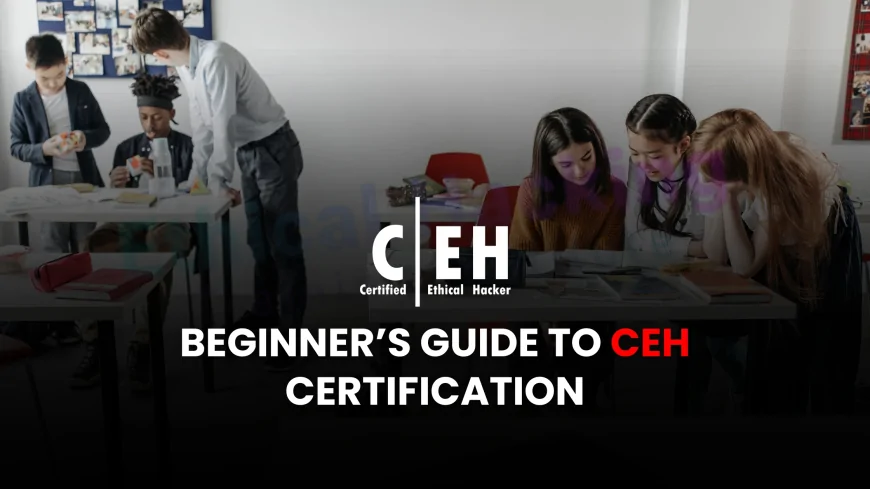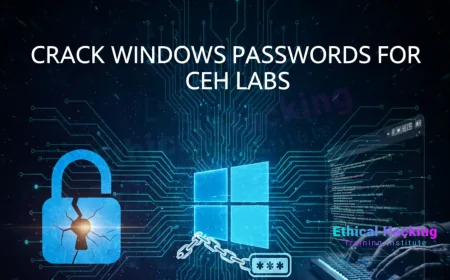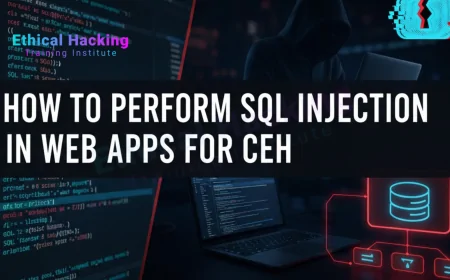Everything You Need to Know About CEH Certification | The Beginner's Guide to Certified Ethical Hacker (CEH) Certification
Explore CEH Certification in-depth: syllabus, exam, eligibility, cost, benefits, career scope, and FAQs in this complete 2025 guide.

Table of Contents
- What is CEH Certification?
- Who Should Pursue CEH?
- Eligibility Criteria
- CEH Exam Details
- Syllabus and Domains Covered
- What’s New in CEH v13?
- Training Options for CEH
- Key Benefits of Getting CEH Certified
- Skills You Will Learn
- Job Roles After CEH
- Salary Expectations
- Cost of CEH Certification
- Recertification Requirements
- Self-Study vs Training Program
- Global Recognition and Credibility
- Online vs Offline CEH Courses
- Top Resources to Prepare
- How to Apply for CEH
- Common Mistakes to Avoid
- FAQs
- Conclusion
What is CEH Certification?
Recognized globally, the CEH certification from EC-Council validates essential ethical hacking and information security skills. It validates your skills in identifying vulnerabilities in computer systems and using the same tools and techniques as malicious hackers—but in a lawful and legitimate manner to assess the security posture of systems. CEH holders are well-equipped to become penetration testers, ethical hackers, cybersecurity analysts, and network defenders.
Who Should Pursue CEH?
This certification is ideal for:
- IT Security Professionals
- Network Administrators
- Cybersecurity Enthusiasts
- Penetration Testers
- System Administrators
- Law Enforcement or Military Personnel in Cyber Operations
Eligibility Criteria
To appear for the CEH exam, you must fulfill one of the two criteria:
- Attend official EC-Council training (no experience required)
- Without training: Possess 2 years of work experience in InfoSec and submit an eligibility application with a non-refundable fee
CEH Exam Details
- Exam Code: 312-50 (ECC Exam)
- Duration: 4 hours
- Format: Multiple Choice Questions
- Number of Questions: 125
- Passing Score: Around 60%–85% (varies by exam form)
- Delivery: Pearson VUE or EC-Council exam portal
Syllabus and Domains Covered
The CEH v13 exam covers the following domains:
- Information Security and Ethical Hacking Overview
- Footprinting and Reconnaissance
- Scanning Networks
- Enumeration
- Vulnerability Analysis
- System Hacking
- Malware Threats
- Sniffing
- Social Engineering
- Denial of Service
- Session Hijacking
- Evading IDS, Firewalls, and Honeypots
- Hacking Web Servers
- Hacking Web Applications
- SQL Injection
- Hacking Wireless Networks
- Hacking Mobile Platforms
- IoT and OT Hacking
- Cloud Computing
- Cryptography
What’s New in CEH v13?
CEH v13 has been updated with the most current cyber threats, including:
- Modern malware analysis
- New cloud security modules
- Hands-on labs using the Parrot OS
- Coverage of the MITRE ATT&CK framework
- Expanded focus on IoT and OT hacking
Training Options for CEH
There are multiple ways to prepare:
- EC-Council Accredited Training Centers (ATCs)
- EC-Council's iClass platform (live online)
- Self-paced learning packages
- Authorized third-party training platforms
Key Benefits of Getting CEH Certified
- Validated ethical hacking skills
- Global job opportunities
- Access to EC-Council’s elite community
- Better salary prospects
- Entry into advanced cybersecurity roles
Skills You Will Learn
- Footprinting and reconnaissance
- System penetration and exploitation
- Vulnerability assessment
- Web application hacking
- Wireless and mobile hacking
- Cloud and IoT security testing
Job Roles After CEH
- Ethical Hacker
- Penetration Tester
- Information Security Analyst
- Security Consultant
- Cybersecurity Auditor
- Red Team Specialist
Salary Expectations
The average salary for a CEH-certified professional varies by region and role:
- India: ₹6 to ₹20 LPA
- US: $75,000 to $130,000 per year
- UK: £40,000 to £90,000 per year
Cost of CEH Certification
The total cost may vary, but generally includes:
- Training: $850–$3,000 depending on format
- Exam Fee: ~$1199
- Eligibility Application (if self-study): $100
Recertification Requirements
To maintain your Certified Ethical Hacker (CEH) status, you must comply with the EC-Council’s Continuing Education policy. Here’s everything you need to know:
Certification Validity
-
The CEH certification is valid for 3 years from the date of certification.
Continuing Education Credits (ECE)
-
Maintaining your CEH status requires earning 120 Continuing Education credits from EC-Council every three years.
-
These credits demonstrate that you’re actively staying up-to-date with cybersecurity skills and practices.
How to Earn ECE Credits
You can earn ECE credits through several approved activities, such as:
-
Attending cybersecurity-related conferences and webinars
-
Completing advanced certifications (e.g., CHFI, ECSA, CISSP)
-
Teaching or training security-related content
-
Publishing cybersecurity articles, books, or blogs
-
Participating in security research or writing tools/scripts
-
Attending EC-Council’s official training programs
Each activity has a specific credit value, outlined in the EC-Council ECE Policy (external link — can be cited if you publish online).
ECE Credit Submission Process
-
Log into the EC-Council Aspen Portal
-
Submit documentation or proof for each qualifying activity
-
EC-Council will audit and approve the submitted credits
Failure to Renew
If you do not earn and report the required 120 ECE credits within the 3-year period:
-
Your CEH certification will be considered inactive
-
You may need to retake the exam or meet other reinstatement requirements
Annual Maintenance Fee
-
CEH certification holders are expected to pay a yearly membership fee, generally costing about $80 USD.
-
This fee supports your access to EC-Council’s resources and maintains your good standing
Summary
| Requirement | Details |
|---|---|
| Validity | 3 years |
| ECE Credits | 120 over 3 years |
| Submission | Aspen Portal |
| Annual Fee | ~$80/year |
| Renewal Failure | Certification expires or becomes inactive |
Self-Study vs Training Program
Self-Study: Cost-effective, requires discipline and experience.
Training: Structured, guided by experts, often includes labs and practice exams.
Global Recognition and Credibility
CEH is recognized by organizations like DoD (US Department of Defense), and preferred by Fortune 500 companies globally.
Online vs Offline CEH Courses
Online training is flexible and convenient; offline training offers better networking and mentorship. Choose based on your learning style.
Top Resources to Prepare
- CEH Official Study Guide (EC-Council)
- CEH Certified Ethical Hacker All-in-One by Matt Walker
- Practice exams on Boson or ExamLabs
- Virtual Labs: iLabs, Hack The Box, TryHackMe
How to Apply for CEH
- Choose your preparation method (training or self-study)
- Register through EC-Council or Pearson VUE
- Prepare thoroughly using books, labs, and practice tests
- Appear for the exam
- Get certified and showcase your badge!
Common Mistakes to Avoid
- Skipping hands-on labs
- Underestimating theoretical concepts
- Neglecting practice tests
- Using outdated resources
- Not managing time effectively in the exam
Frequently Asked Questions (FAQs)
1. What is the CEH certification?
CEH (Certified Ethical Hacker) certifies your skills to think like a hacker and test systems legally for vulnerabilities.
2. Who offers the CEH certification?
It is offered by the EC-Council (International Council of E-Commerce Consultants).
3. What is the latest CEH version?
As of 2025, CEH v13 is the latest version.
4. How long is the CEH exam?
The exam duration is 4 hours and consists of 125 multiple-choice questions.
5. Is CEH worth it in 2025?
Yes, it remains a top credential for ethical hackers and security analysts.
6. Can I take the CEH exam without training?
Yes, if you have at least 2 years of InfoSec experience and EC-Council approves your eligibility.
7. Is CEH recognized globally?
Absolutely. CEH is accepted worldwide, including by the U.S. DoD and many MNCs.
8. What is the CEH exam cost?
It typically ranges from $950 to $1200 depending on location and exam provider.
9. What’s the CEH passing score?
It varies per exam form but is usually between 60% and 85%.
10. What jobs can I get after CEH?
Penetration Tester, Ethical Hacker, Security Consultant, Red Team Member, etc.
11. How long is CEH valid?
CEH is valid for 3 years, with ECE credits required for renewal.
12. What study material is best for CEH?
Use official EC-Council materials, Matt Walker’s AIO Guide, and practice labs.
13. What is Parrot OS in CEH?
Parrot OS is a Linux distro used for hacking labs and simulations in CEH v13.
14. Can I learn CEH online?
Yes, EC-Council and other platforms offer online training options.
15. How hard is CEH?
Moderately difficult if you study consistently and practice hands-on labs.
16. What’s the difference between CEH and CISSP?
CEH focuses on hacking techniques; CISSP is broader in InfoSec management.
17. How to book the CEH exam?
You can book via Pearson VUE or the EC-Council website.
18. Is CEH good for beginners?
Yes, it’s suitable if you have basic networking and IT knowledge.
19. Does CEH teach coding?
Basic scripting may be involved, but it's not a coding-heavy course.
20. What are ECE credits?
ECE (EC-Council Continuing Education) credits are needed to renew your certification every 3 years.
Conclusion
CEH certification is one of the most respected credentials in the cybersecurity domain. Whether you're a budding ethical hacker or a security professional looking to upgrade your skill set, CEH provides the knowledge, recognition, and skills to advance your career. With the evolving threat landscape, staying certified and up-to-date with CEH gives you a competitive edge and opens doors to global opportunities in ethical hacking and information security.
What's Your Reaction?
 Like
0
Like
0
 Dislike
0
Dislike
0
 Love
0
Love
0
 Funny
0
Funny
0
 Angry
0
Angry
0
 Sad
0
Sad
0
 Wow
0
Wow
0

















